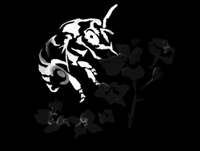Treatment of Poisoned Honey Bee Hives
Very little can be done for individual bees that have received a lethal dose of a chemical.
Little is known about sublethal effects of pesticides, but it is likely of the bees will be less able to perform their duties inside and outside the hive, even if they do recover from the initial pesticide intoxication. A hive may still recover, however, if the queen is intact and resources (supplementary sugar syrup, plus pollen or pollen substitute) are provided to stimulate rearing of replacement brood. If a pesticide application results in a bee kill, both the applicator and farmer should be notified immediately to terminate spraying. This will stop further damage and allow hives to be moved or protected.
Selected References
Scott-Dupree, C.D., Winston, M., Hergert, G., Jay, S.C., Nelson, D., Gates, J., Termeer, B., & Otis, G. 1995. A guide to managing bees for crop pollination. Canadian Association of Professional Apiculturists, Aylesford NS.
**For more detailed information and a complete list of references, download the following: Woodcock, T.S. 2012. Pollination in the agricultural landscape: best management practices for crop pollination. University of Guelph. 113 pp.
